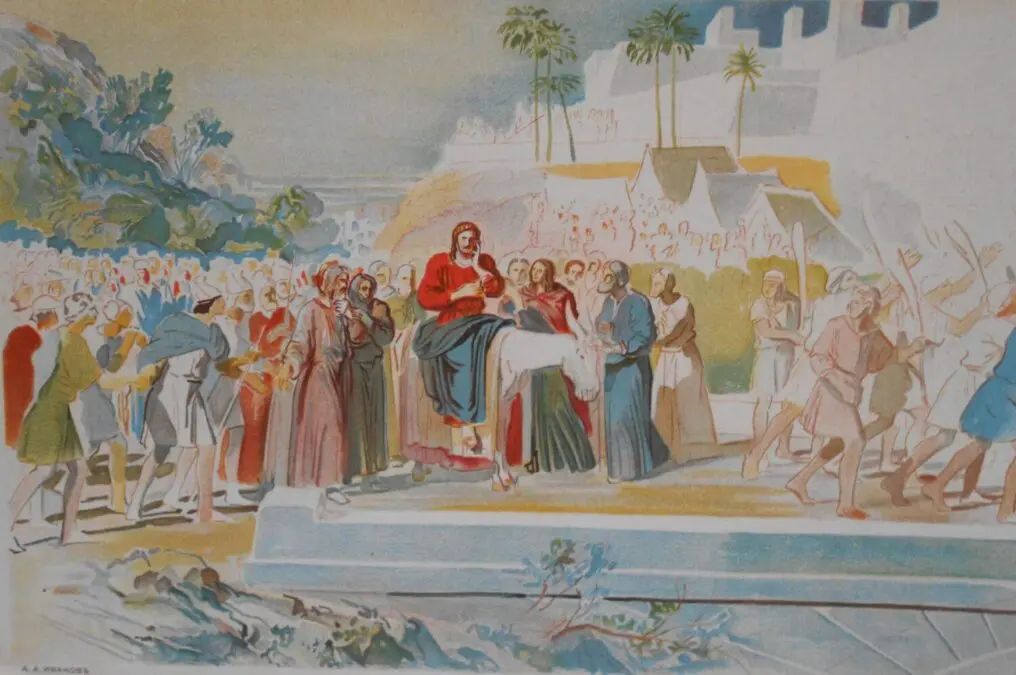By St. John Chrysostom
Priests are the men entrusted with spiritual birth and regeneration through Baptism. Through them we clothe ourselves in Christ and are buried together with the Son of God in order to become members of this blessed Head – the Church. Therefore, we should not only fear them more than rulers and kings, but also honor them more than our own fathers, who begat us “of blood and of the lust of the flesh” (John 1:13), while they are ” culprits” for our birth from God, for our blessed new existence, for our true freedom and gracious adoption.
The Jewish priests had power to cleanse the body from leprosy, or rather not to cleanse, but to testify to the cleansing (Lev. 14), and we know how enviable the priestly dignity was then. And our priests have been given the power not only to testify, but to perfectly cleanse – not bodily leprosy, but mental impurity. Therefore those who do not respect them commit a crime far greater than that of Dathan and his accomplices, and become worthy of a greater punishment. They sought power that did not belong to them (Numbers 16), having a high opinion of it, proving it precisely by their diligent pursuits. And now, when the priesthood has adorned itself much more and has risen to such a high degree, disrespect for it expresses much greater audacity, for it is not the same thing to seek an honor that does not belong to you and to despise that good . The latter is as much more grievous than the former, as contempt and respect are different from each other. Is there such a wretched soul as would despise so great a good? I can’t imagine such a person except someone in a demonic frenzy.
God has given priests more power than parents in the flesh, not only for punishments, but also for benefits. The one and the other differ as the present life differs from the life to come. Some give birth to us for the present life, others for the future. Parents cannot save their children from bodily death, nor even protect them from impending disease, and priests often save the suffering and perishing soul either by mild punishment, or by keeping it from falling in the first place; not only by instruction and suggestion, but also by the help of prayer.
In addition to reviving us (through baptism), they also have the power to free us from subsequent sins: “If anyone among you is sick, let him call the elders of the church and let them pray over him, anointing him with oil in the name of the Lord. And the prayer of faith will heal the sick, and the Lord will raise him up; and if he has committed sins, they will be forgiven him” (James 5:14-15).
Carnal parents can render no help to their children if they offend any of those in authority, high and mighty, and priests often reconcile people not to nobles or kings, but to God himself, angered by their deeds.
No one loved Christ more than Paul, no one showed more zeal than he; no one was honored with greater grace than he. But, although he had these advantages, he continued to fear and tremble both for his authority and for his subjects. “But I am afraid, lest as the serpent beguiled Eve with his cunning, so your thoughts may be corrupted because of your simplicity in Christ” (2 Cor. 11:3) “… And I was with you in weakness, in fear and in great trembling” (1 Cor. 2:3), says a man who was caught up and carried to the third heaven, became a partaker of the mysteries of God, suffered as many deaths as he lived for days, according to what was witnessed to him and unwilling to take advantage of the authority given to him by Christ, lest any of the believers be deceived (1 Cor. 10).
If he, who had done more than was commanded by God, and who sought in all things not profit for himself, but profit for those under him, was always filled with such fear, gazing at the greatness of the power entrusted to him, what should we (priests) feel, often seeking our own benefit? We who not only do no more than what Christ commands, but often transgress His commands.
“Who does not faint,” said the apostle Paul, “so that I also do not faint? Who is tempted, and I do not burn?” (2 Cor 11:29). This is how humble the priest should be, and it is even a little. What else do I mean? “I would pray that I myself might be excommunicated from Christ for my brethren, my kinsmen in the flesh,” (Rom. 9:3)—he who can utter such words, whose soul has been exalted to such a desire, he may justly be condemned when he avoided the priesthood. And a stranger to such virtues, as I, deserves censure, not when he avoids it, but when he accepts it.
Illustration: A. A. Ivanov, The Lord’s Entry into Jerusalem (sketch), XIX c.







